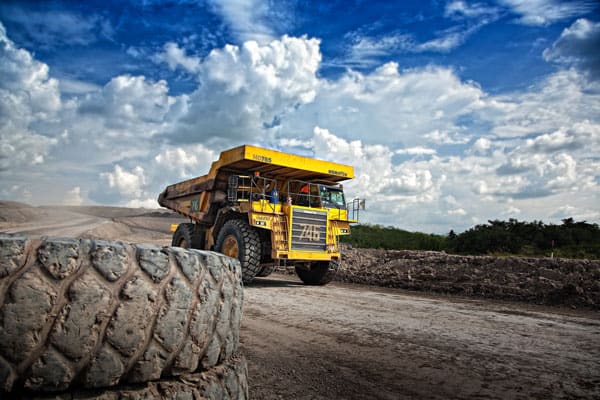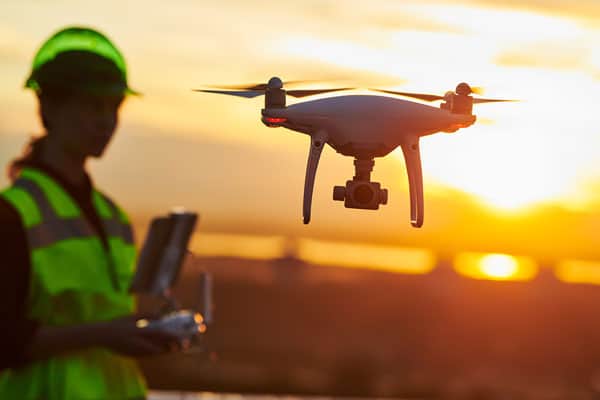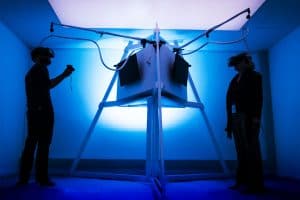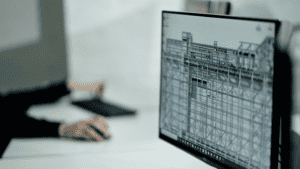Virtual Reality Training for Construction Safety
Artificial Intelligence in Construction
In recent years, the construction industry has witnessed a significant transformation with the integration of artificial intelligence (AI). AI in construction has revolutionized the way construction projects are planned, designed, and executed. With its ability to analyze vast amounts of data, AI is enhancing efficiency, safety, and productivity in the construction sector. Using artificial intelligence in the construction sector helps construction companies be more productive. AI also improves the quality and safety of those projects.
McKinsey highlights an estimated $50 billion was invested in architecture, engineering and construction tech between 2020 to 2022, 85 percent higher than the previous three years.
“Stakeholders across the project lifecycle, including contractors, operators, owners, and service providers, can no longer afford to conceive of AI as technology that’s pertinent only to other industries,” – McKinsey
Artificial intelligence has become a game-changer in the construction industry, offering numerous benefits and opportunities for improvement. In this article, we will explore the benefits of artificial intelligence in construction and how it is reshaping the industry. Let’s delve into the key advantages that AI brings to the table.
Jump to a section in this article:
- 5 benefits of using Artificial Intelligence in the Construction Industry
- How to use AI in Construction Management
- The power of generative AI in construction
- The future of generative AI in construction
5 benefits of using Artificial Intelligence in the Construction Industry
-
Increased Efficiency and Accuracy
AI-powered systems automate repetitive tasks, reducing the need for manual labor and minimizing human errors. With AI, construction companies can streamline processes such as project scheduling, material procurement, and resource allocation. These systems can analyze historical data, optimize workflows, and provide real-time information, enabling project managers to make timely decisions. Thus, AI enhances efficiency and accuracy, leading to cost savings and improved project outcomes.
-
Improved Safety Measures
Safety is a paramount concern in the construction industry. AI technology can play a critical role in enhancing safety measures on construction sites. AI-powered systems can monitor working conditions, detect potential hazards, and alert workers about potential risks. Furthermore, AI algorithms can analyze historical safety data to identify patterns and predict potential accidents, allowing for proactive intervention. By deploying AI in construction, companies can minimize workplace accidents and ensure a safer working environment for their employees.
-
Enhanced Project Planning and Design
Artificial intelligence enables advanced project planning and design capabilities. AI systems can analyze complex data sets to create accurate 3D models and simulations, facilitating the visualization of construction projects. These models can help stakeholders identify potential design flaws and make necessary adjustments before construction begins. Additionally, AI algorithms can optimize project schedules, taking into account constraints such as weather conditions and resource availability. By leveraging AI, construction companies can save time, reduce costs, and deliver projects more efficiently.
-
Optimal Resource Management
Managing resources effectively is crucial for the success of any construction project. AI technology can aid in optimizing resource allocation, including materials, equipment, and labor. AI-powered systems can forecast demand, track inventory levels, and automate procurement processes. Moreover, AI algorithms can analyze historical project data to assess resource utilization patterns and make informed decisions regarding future resource allocation. By maximizing resource efficiency, construction companies can minimize waste and enhance project profitability.
-
Real-Time Monitoring and Predictive Maintenance
One of the key advantages of AI in construction is its ability to provide real-time monitoring and predictive maintenance. AI-powered sensors can be installed at construction sites to collect data on various parameters, such as temperature, humidity, and structural integrity. This data can be analyzed in real-time to identify potential issues and initiate preventive measures. Additionally, AI algorithms can predict equipment failure based on historical data, enabling proactive maintenance. By leveraging AI for monitoring and maintenance, construction companies can avoid costly downtimes and ensure the smooth progress of projects.
AI in Construction is a Game Changer
Artificial intelligence has become an indispensable tool in the construction industry. By embracing AI technology, construction companies can stay competitive, deliver projects more efficiently, and achieve better overall project outcomes. As the construction industry continues to evolve, the role of artificial intelligence will only become more prominent.
Construction companies must modernize operations to solve the problems facing the industry today. Problems include low profitability rate, schedule delays, cost overruns, and safety issues.
Digitization is the future of the construction industry. Companies that quickly move to upgrade their technologies will gain a distinct advantage. With artificial intelligence, the construction sector can tackle current issues and avoid past mistakes.
There are many ways AI can help the construction industry flourish.
SEE ALSO:
Construction Technology to Transform your Business
How to use AI in Construction Management
-
Eliminate tedious tasks by integrating AI into your project management workflow
Tedious and time-consuming tasks plague the construction process. A project manager needs to organize the project, assign work, and keep track of employees. Often these tasks are completed manually resulting in wasted time and resources. Artificial intelligence can efficiently handle all these mundane tasks with few or zero errors. Another application of AI is automating task delegation. With data on employees, an AI system can automatically assign tasks based on experience, skills, and availability. This simplifies the process and allows employees to focus on productivity.
-
Optimize project design phase with AI-powered insights
Currently, construction design is rather outdated and slow to take advantage of modern technology. Consequently, it’s slowing down the building process. With ai in building design, you and your contractors can glean insights from building data, material data, and the data they collect from the environment, for example, to identify the best way to design and develop a project.
-
Capture and analyze job site data
You can use ai construction equipment to autonomously capture 3D scans of your construction sites. You can then feed that data into a deep neural network that classifies the progress of the various aspects of your project. This allows your management team to handle small issues before they become major problems.
In the future, algorithms will use “reinforcement learning,” an AI technique that lets algorithms learn based on trial and error, to assess endless combinations and alternatives based on similar projects.
-
Geospatial AI and Drones for land survey and mapping
Geospatial Information Systems (GIS), Drones, and Geospatial AI (GeoAI) significantly reduce the time it usually takes to gather accurate survey maps and aerial images of a job site. Drones can be used for tracking the project updates and tracking issues at a job site. This offers richer insights for improving decision-making and keeping projects on track.

Artificial intelligence in building: Autonomous construction vehicles will make time-consuming tasks easier and faster. -
Increase Productivity with AI-Driven Vehicles
Some companies are beginning to offer self-driving construction machinery that can perform repetitive tasks, such as welding, bricklaying, pouring concrete, and demolition, more efficiently than people. For instance, autonomous or semi-autonomous bulldozers are being used to do excavation and prep work. These bulldozers can prepare a job site to your exact specifications with the help of a human programmer. Not only does this free up your employees, who can concentrate on the actual construction work, it also enables you to complete the project more quickly.
-
Speed project delivery with offsite construction
Increasingly, construction is relying on offsite factories staffed by autonomous robots that piece together parts of a building, which are then assembled by employees at the construction site. Autonomous machines in an assembly line can complete structures, such as walls, more efficiently than your employees. Since the autonomous machines are doing this work, your employees can complete more high-value tasks, such as plumbing and installing the HVAC and electrical systems.
-
Improve workplace safety
Every construction project has some risk. And the larger the project, the bigger the risk, in part because multiple subcontractors in different trades are working side-by-side on a job site. If you’re a general contractor, you can use AI and machine learning tools to monitor and prioritize risk on your job site. By using artificial intelligence in construction safety, you can rate subcontractors based on a risk score and assign priority to certain issues so your project manager can work closely with high-risk teams to mitigate any problems.
Additionally, the Internet of Things (IoT) is automating job sites to make them safer. Wearable sensors can identify the location of your workers and provide alerts if one of them slips and falls, for instance.
-
Automate site activity monitoring
By automating your activity monitoring, your business will be able to make smarter decisions based on hard data. With AI, you can capture, track, and classify anything that goes in and out of the job site whether they be vehicles, equipment, or people.
Tracking what happens on your job site means you can gather additional insights. For example, you can use this data to provide alerts and notifications to trigger rapid responses. This is crucial to preventing safety hazards, monitoring cost and materials, and ensuring employee productivity. Data collected from the job site can be accessed by stakeholders for the real-time updates. Construction companies can use drones for data collection.

Combining drones and artificial intelligence allows you to quickly gather and analyze job site data. Combining drones and artificial intelligence allows you to quickly gather and analyze job site data.
-
Make sense of big data with machine learning and data analytics
Machine learning systems learn from the endless amount of data they are exposed to every day. As such, every job site becomes a potential data source. As time goes on and more data becomes available, machine learning makes the data analytics systems “smarter.” With the help of AI and machine learning, you can analyze the data generated from images captured via drones, mobile devices, and security sensors, for example, to glean insights that will help your company operate more efficiently.
The Power of Generative AI
Generative AI involves the use of machine learning algorithms to generate multiple design alternatives based on predefined constraints and objectives. Through a combination of data analysis, pattern recognition, and iterative learning, Generative AI offers architects and engineers the ability to explore a vast range of design possibilities that were previously unimaginable. By evaluating thousands or even millions of design options, Generative AI helps identify the most optimized solutions in terms of cost, performance, and sustainability.
Streamlining the Design Process
With Generative AI, designers can quickly generate and evaluate options, allowing for faster decision-making. Iterative design cycles that used to take weeks or even months can now be shortened to a matter of hours. This not only saves valuable time but also enhances the creativity and efficacy of the design process.
-
Intelligent Optimization
Generative AI algorithms can consider various parameters, such as structural integrity, energy efficiency, and material usage, to optimize designs. By automatically exploring and testing design alternatives, Generative AI can identify optimal configurations that meet specific project requirements. This level of intelligent optimization results in reduced material waste, improved energy efficiency, and ultimately, more sustainable and resource-conscious buildings.
-
Collaboration and Knowledge Sharing
Generative AI facilitates collaboration among architects, engineers, and other project stakeholders. By generating design variations and sharing them digitally, team members can provide feedback and collectively work towards finding the best solution. This collaborative approach fosters innovation, encourages diverse perspectives, and accelerates the design process.
-
Enhancing Building Performance
Generative AI empowers architects and engineers to achieve superior building performance. By analyzing data and simulating various scenarios, Generative AI can optimize building shape, orientation, and layout for enhanced energy efficiency, daylight utilization, and occupant comfort. This technology allows for the integration of smart systems and sustainability features, resulting in buildings that are not only visually appealing but also functional and environmentally conscious.
-
Overcoming Design Limitations
Generative AI can help overcome design limitations by pushing boundaries and exploring unconventional ideas. By challenging established norms and embracing innovative design solutions, Generative AI opens up new possibilities in construction. Architects are now able to create structures with complex geometries, intricate detailing, and dynamic forms that were previously deemed impractical or unfeasible. This newfound freedom inspires architectural creativity and leads to the construction of truly unique and inspiring buildings.
The Future of Generative AI in Construction
As Generative AI continues to advance, its potential applications in construction will undoubtedly expand. Here are some potential future developments:
-
Safety Optimization
Generative AI can analyze and optimize construction plans to minimize safety risks and improve worker well-being on-site.
-
Materials Innovation
By exploring alternative materials and combinations, Generative AI can drive innovations in construction materials, making buildings more sustainable and resilient.
-
Urban Planning
Generative AI can aid urban planners in developing efficient, livable, and environmentally conscious cities by optimizing transportation networks, green spaces, and infrastructure.
-
Renovation and Retrofitting
Generative AI can be utilized to optimize renovation and retrofitting projects, identifying efficient energy-saving measures and cost-effective solutions.
Generative AI is unquestionably revolutionizing the construction industry. By leveraging advanced algorithms and machine learning, Generative AI streamlines the design process, optimizes building performance, enhances collaboration, and pushes the boundaries of architectural creativity. As this technology continues to evolve, we can expect even more incredible developments that will shape the future of construction. Embracing Generative AI in the construction industry is not just a trend but a necessity to stay competitive in the evolving landscape of building design and construction.
Adopting Smart Construction Technology
AI in construction is increasing throughout the industry as part of a larger shift toward smart construction technology. In fact, McKinsey called artificial intelligence “construction technology’s next frontier,” and predicted that it will play a more significant role in digital technology in construction. That means if you want to succeed in the sector, you have to quickly come to terms with how artificial intelligence in construction will affect the industry and your company.
Are you ready to embrace the power of AI in construction?
Invonto has years of experience building custom construction software solutions. We partner with innovative companies for R&D and developing prototypes for AI and other emerging technologies. Contact us today if you are interested in learning more about our services or want to schedule a free consultation.



